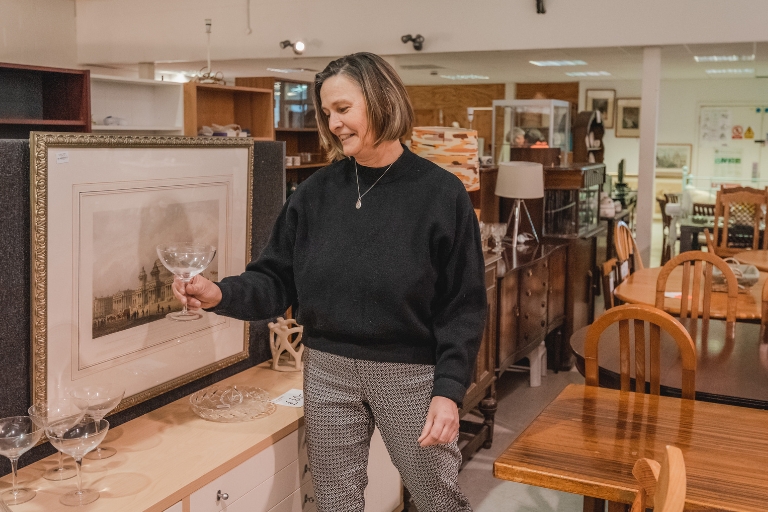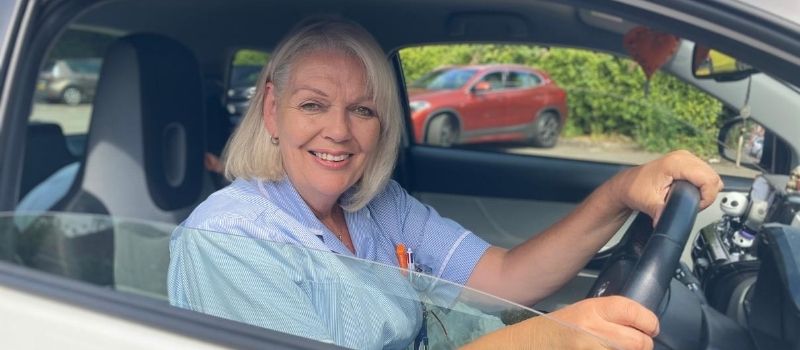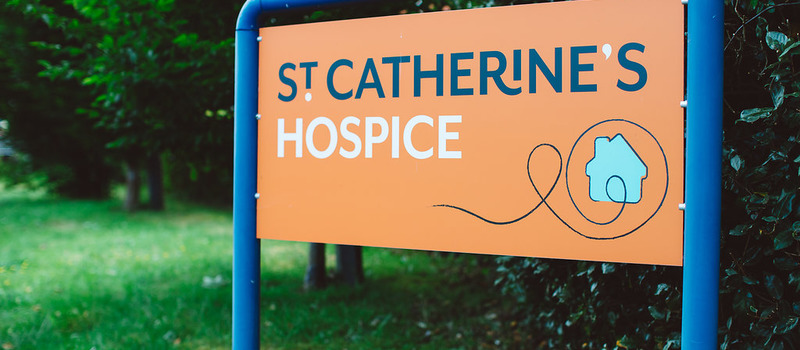Coronavirus hasn’t changed the care and support we give
Karen Fentum is a Nursing Assistant who cares for local people in their homes. She’s worked at St Catherine’s Hospice for nine years.
We asked if she could share a bit about the work of the Community Care Team during the pandemic.
Coronavirus hasn’t changed the care and support we give, but it has changed some of the ways we work. We’re still out visiting people every day. That’s never altered. But we aren’t travelling together in the same car to people’s homes like we used to – to minimise the risk of transmitting Coronavirus to patients and their families, and to each other. It’s so important to keep ourselves safe, too, so we can continue caring for the people in our community who need us. So, for every visit, we drive in two separate cars now, which means we’re all doing a lot more mileage.
We’ve also had to adapt to wearing PPE, and families are getting more used to us wearing it now too. They know it’s there to keep them safe from infection and we do everything we can to make them feel comfortable. One thing we worried about was that wearing masks would stop patients seeing our faces – and our smiles – but they can still see our eyes and know that we care.
We’re able to give men a shave and wash people’s hair with a special shampoo shower cap – people tell us it feels amazing afterwards.
Since the virus hit, a lot of family members have moved in with their relatives, so they didn’t risk taking the virus into their relatives’ home.
Families often talk to us during our visits, sharing their concerns, and we can refer them to other colleagues in the hospice for all sorts of help – medical, emotional, financial, and spiritual. We remind people that we’re always available 24/7 by phone too.
The work we do also helps to ease the pressure on GPs and District Nurses. If someone needs a morphine syringe driver set up, and a District Nurse can’t get there – we can do it. We know the GPs well and have a really good relationship with them. They’ve all got our mobile numbers and can call us when they want to check something or find out how their patient is.
Whenever we’re giving care, we’re also checking people’s skin and moving their limbs and positions to make sure they’re not getting skin damage – and we will call in other members of the team at the hospice, or other local services, to make sure people get the best possible care and support. Sometimes, we’ll go into someone’s home when they’ve just been referred to us and find they don’t have the equipment they need. We have to think quickly and often arrange for a special, adjustable bed to be brought in and other support equipment from our therapies team.
If there’s a sink full of washing up or a shopping delivery has arrived at someone’s home, we’ll wash up or put the shopping away. We make light meals for people too…Anything that makes life a little bit easier for local people who are going through such a difficult time.
You learn to pick up and recognise what people need. Some people are so tired that having a full wash wears them out, so we freshen them up – even something as simple as that can really lift someone’s mood. Other people we visit feel up to a full bed bath. We’re able to give men a shave and wash people’s hair with a special shampoo shower cap – people tell us it feels amazing afterwards.
We visited one family recently, where a daughter was caring for both of her poorly parents. She was absolutely exhausted. So we arranged a night sit for her so she could get a good night’s rest. The change in her when we next visited was unbelievable. Getting a good night’s rest can make a huge difference when you’re caring for someone who is so unwell.
We try to help people in whatever ways possible. If there’s a sink full of washing up or a shopping delivery has arrived at someone’s home, we’ll wash up or put the shopping away. We make light meals for people too – make a sandwich, or pop in a microwave meal – and cups of tea and coffee. Anything that makes life a little bit easier for local people who are going through such a difficult time.
We’re still out visiting people every day. That’s never altered. But we aren’t travelling together in the same car to people’s homes like we used to – for every visit, we drive in two separate cars now, which means we’re all doing a lot more mileage.
Sometimes people don’t want us to do anything other than sit and talk to them about their worries. As they become less well, people often want to have conversations with us about death and dying and we can’t be afraid to have those conversations with them. We’re often with people and their families when they die, so it’s not uncommon for people to ask us things like ‘Am I dying?’, or, ‘Will I die today?’. We’re there for them, to guide them through, and we’re always honest.
As a team, we support each other and discuss any worries we might have. I lost my Mum in a care home at the start of lockdown and, in the few weeks before, there was a man we were looking after who was waiting for a result for possible COVID-19 after coming out of hospital. If I had visited him, I wouldn’t have been able to see Mum before she died. The team were really understanding, and my colleagues covered those visits, so I was able to continue to see my Mum in her care home. And, when Mum died, the team got together remotely with me, and all lit a candle and shared a glass of wine together to give me support.
That spirit keeps us all going and helps us to continue to be there for local people through the tough times. So does the support from kind people in our local community.
Karen Fentum
St Catherine’s Hospice Community Care Team
P.S. A gift of £50 could cover the cost of a tank of petrol for the nurse who looks after your area, so they can make sure no one in your community is left struggling without the support they need.
Find out more: Continuing to Care – help us keep supporting local people who really need us.












